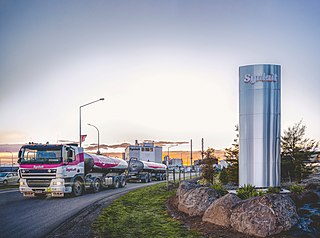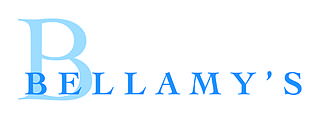
Infant formula, also called baby formula, simply formula, baby milk or infant milk, is an ultra-processed food designed and marketed for feeding to babies and infants under 12 months of age, usually prepared for bottle-feeding or cup-feeding from powder or liquid. The U.S. Federal Food, Drug, and Cosmetic Act (FFDCA) defines infant formula as "a food which purports to be or is represented for special dietary use solely as a food for infants by reason of its simulation of human milk or its suitability as a complete or partial substitute for human milk".

Nestlé S.A. is a Swiss multinational food and drink processing conglomerate corporation headquartered in Vevey, Switzerland. It has been the largest publicly held food company in the world, measured by revenue and other metrics, since 2014. It ranked No. 64 on the Fortune Global 500 in 2017. In 2023, the company was ranked 50th in the Forbes Global 2000.

Danone S.A. is a French multinational food-products corporation based in Paris. It was founded in 1919 in Barcelona, Spain. It is listed on Euronext Paris, where it is a component of the CAC 40 stock market index. Some of the company's products are branded Dannon in the United States.

Fonterra Co-operative Group Limited is a New Zealand multinational publicly traded dairy co-operative owned by New Zealand farmers. The company is responsible for approximately 30% of the world's dairy exports and with revenue exceeding NZ $22 billion, making it New Zealand's largest company. It is the sixth-largest dairy company in the world as of 2022, as well as the largest in the Southern Hemisphere.

Powdered milk, also called milk powder, dried milk, or dry milk, is a manufactured dairy product made by evaporating milk to dryness. One purpose of drying milk is to preserve it; milk powder has a far longer shelf life than liquid milk and does not need to be refrigerated, due to its low moisture content. Another purpose is to reduce its bulk for the economy of transportation. Powdered milk and dairy products include such items as dry whole milk, nonfat (skimmed) dry milk, dry buttermilk, dry whey products and dry dairy blends. Many exported dairy products conform to standards laid out in Codex Alimentarius.

The Asahi Group Holdings, Ltd. is a Japanese beverage holding company headquartered in Sumida, Tokyo.

White Rabbit Creamy Candy is a brand of milk candy manufactured by Shanghai Guan Sheng Yuan Food, Ltd., in China. It is an iconic cultural brand and has been in production since 1943. White Rabbit candy is part of the childhood memories of many mainlanders and Hong Kongers, and has been featured in many classic Chinese movies and TV series.
Inner Mongolia Mengniu Dairy (Group) Limited by Share Ltd. is a Chinese manufacturing and distribution company of dairy products and ice cream. The company is headquartered in Hohhot, Inner Mongolia and manufactures dairy products under the Mengniu brand.
In China, the adulteration and contamination of several food and feed ingredients with inexpensive melamine and other compounds, such as cyanuric acid, ammeline and ammelide, are common practice. These adulterants can be used to inflate the apparent protein content of products, so that inexpensive ingredients can pass for more expensive, concentrated proteins. Melamine by itself has not been thought to be very toxic to animals or humans except possibly in very high concentrations, but the combination of melamine and cyanuric acid has been implicated in kidney failure. Reports that cyanuric acid may be an independently and potentially widely used adulterant in China have heightened concerns for both animal and human health.

Westland Milk Products is a dairy company based in Hokitika, New Zealand. It has been owned by Chinese dairy company Yili Group since 2019. It is the third largest dairy processor in New Zealand with a 3.4% market share.
Fosun International Limited is a Chinese multinational conglomerate holding company. Founded in 1992 by Guo Guangchang and four others, the company is headquartered in Shanghai and was incorporated in Hong Kong in 2004. Its Co-CEOs are Chen Qiyu and Xu Xiaoliang. Wang Qunbin joined Guo Guangchang as co-chairman in early 2020. The company is located in 16 countries and is one of the largest privately owned conglomerates in China. It was ranked 371st on the Forbes Global 2000 ranking in 2020.
Sanlu Group CO., Ltd. (SJZSGCZ) was a Chinese dairy products company based in Xinhua District, Shijiazhuang, the capital city of Hebei. It produced one of the oldest and most popular brands of infant formula in China. New Zealand's Fonterra owned 43% of Sanlu.

The 2008 Chinese milk scandal was a significant food safety incident in China. The scandal involved Sanlu Group's milk and infant formula along with other food materials and components being adulterated with the chemical melamine, which resulted in kidney stones and other kidney damage in infants. The chemical was used to increase the nitrogen content of diluted milk, giving it the appearance of higher protein content in order to pass quality control testing. 300,000 affected children were identified, among which 54,000 were hospitalized, according to the latest report in January 2009. The deaths of six babies were officially concluded to be related to the contaminated milk.
This timeline of the 2008 Chinese milk scandal documents how events related to the Chinese dairy products contamination by melamine unfolded. Complaints about kidney problems traced back to a brand of infant formula, subsequent discoveries of melamine contamination of liquid milk, and exported powdered milk of processed food products. The scandal decimated Chinese dairy exports, and re-exposed long-standing concerns about food security, corruption, lack of political checks and balances. Though the scandal came to attention in 2008, its roots can be traced back to events prior to 2008.

Food safety incidents in China have received increased international media scrutiny following the reform and opening of the country, and its joining the World Trade Organization. Urban areas have become more aware of food safety as their incomes rise. Food safety agencies in China have overlapping duties. The 2008 Chinese milk scandal and COVID-19 pandemic received the most attention among food safety incidents.

Synlait Milk Ltd. is a New Zealand dairy processor selling dairy and plant-based nutritional products, ingredients and powders to multinational customers worldwide. It is headquartered in Dunsandel, Canterbury, with additional manufacturing sites in Auckland and Pokeno, a Research and Development Centre in Palmerston North and offices in Beijing and in Shanghai. The company manufactures milk powders and foodservice products such as infant formula, adult and early life nutrition products, ingredients such as lactoferrin and foodservice products such as UHT cream.
In 2013, a wide-scale recall of products sold by dairy producer Fonterra was announced after suspected botulism-causing bacteria were found during safety tests. The contaminated whey products had been sold to third parties who use it to produce infant formula and sports drinks. Approximately 1,000 tonnes of consumer product was affected by the recall across seven countries, but no cases of sickened consumers were reported. China, which imports most of its powdered milk from New Zealand, instituted a temporary ban on the import of the ingredient from New Zealand.

Bellamy's Organic is an Australian organic infant formula and baby food producer, and was a wholly owned subsidiary of Bellamy's Australia before being acquired by China Mengniu Dairy.

Bellamy's Australia is a major Australian food and beverage company, and is the parent company of Bellamy's Organic, Australia's largest organic infant formula producer.

The a2 Milk Company Limited is a dual listed NZX and ASX 50 public listed company that commercialises intellectual property relating to A1 protein-free milk that is sold under the a2 and a2 Milk brands, as well as the milk and related products such as infant formula.













